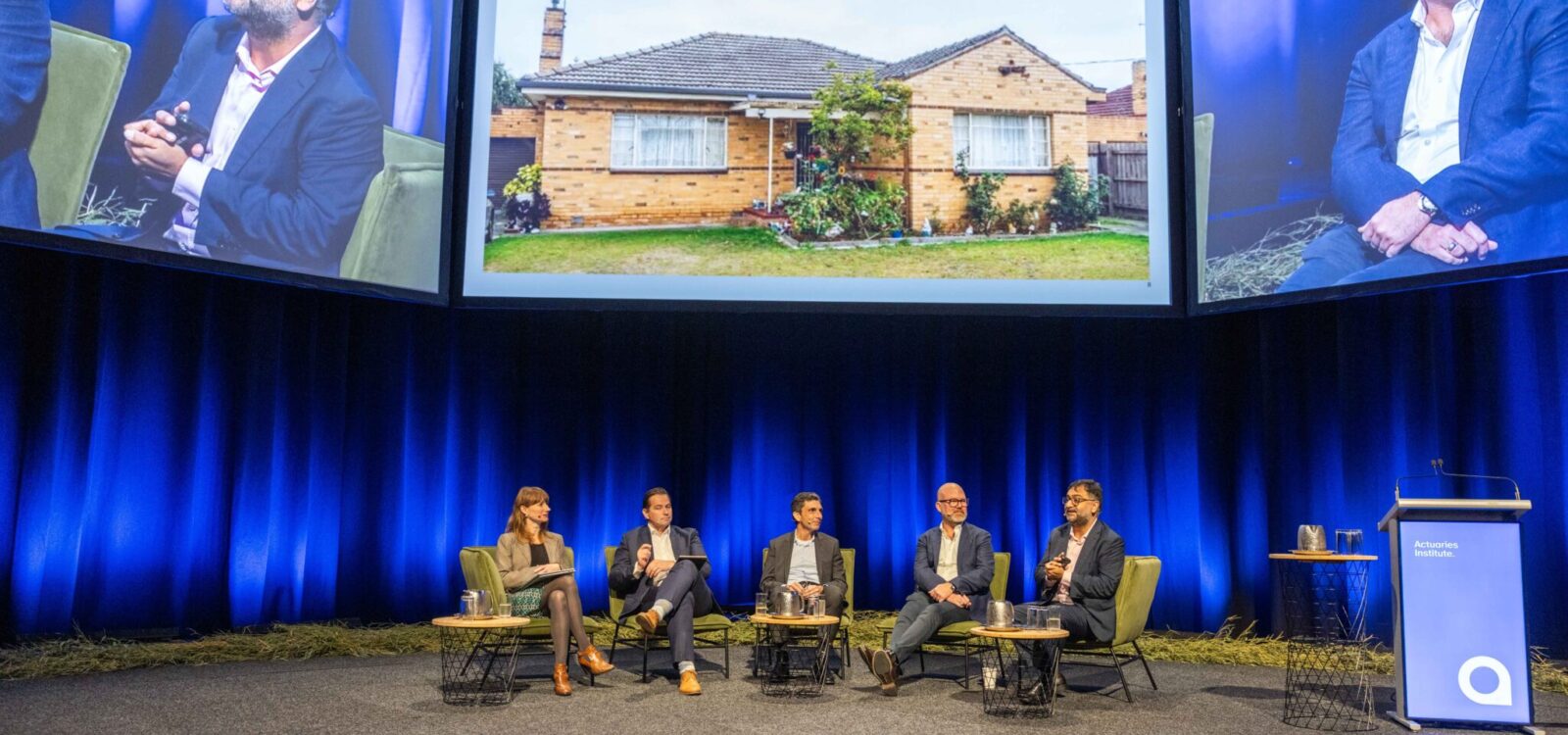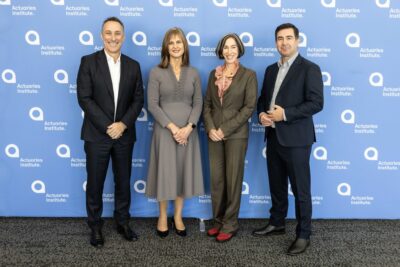
Not Just Covered, Protected
Across three Summit sessions reflecting on the purpose of insurance, actuaries and sector leaders explored why insurance is so much more than just “cover”, traversing its role in society, its human and economic value, and the imperative to make it work better for all.
Life and income insurance – the protection in danger of being left behind?
For many insurance-oriented actuaries, it was extremely gratifying to hear Suzanne Smith, Executive Board Member of the Australian Prudential Regulation Authority (APRA) sum up the value of insurance. She pointed out that in 2022 alone, life insurers paid out over $11 billion in claims to around 85,000 people.

But insurance is about a lot more than just numbers.
“What does insurance do?” Suzanne asked. “It supports the well-being of our society. For individuals, insurance offers the confidence to embark on adventurous travels, pursue entrepreneurial dreams and find that peace of mind knowing that your loved ones are protected. It bolsters the broader economy, promotes financial stability, fosters consumer and business confidence and supports financial markets.”
That’s a catalogue of things insurance can do – when it’s done right. Fittingly, this session (and all Summit sessions on the topic) featured people looking to make sure that happens. Because, despite all these virtues, new retail business sales of life insurance fell over 50% in the past five years.
According to Suzanne, that’s due to pricing, lack of innovation and the weaknesses of legacy product design. Her solution? An industry that designs products for changing needs (e.g. around mental health and ageing), that is focused on individuals, and that builds long-term trust through the right pricing, transparency and responsiveness.
“Consumers need a clearer understanding of their coverage so that they can feel confident in their insurance not just left hoping for the best outcome in the face of disaster,” said Suzanne.
Group CEO and Managing Director of TAL, Brett Clark built on these themes, arguing there may be an old-fashioned way to build “a healthy industry for customers, for insurers and for all stakeholders.” The principles of mutuality, upon which the industry was founded, is the key to solving the “wicked problems” insurance faces. What does the concept of mutuality mean for business today? For Brett, it means “understanding that decisions we make for one group or one cohort of customers, inevitably and in time, one way or another, impact all customers; simply managing our business in a way that is fair and equitable for all customers.”
He suggested the solutions to today’s insurance problems lie in long-term thinking, fairness, equity and judgment – something actuaries are uniquely skilled in. “So today, I encourage you to continue to be a strong and learned voice within the industry and within your individual businesses,” Brett challenged.
Phil Fraser, CEO of QInsure (part of QSuper), spoke about the role of insurance within superannuation; to bridge the gap between work and retirement income, with 3,500 QInsure members on income protection at any given time. Echoing the sentiments Brett Clark, Phil spoke to QInsure’s remit of balancing the needs of employers, members, trustees and shareholders, but first and foremost to serve the members – members who represent Queensland’s 400,000 public sector workers, including nurses, police, teachers and more.
With this duty in mind, Phil spoke about another great challenge in Australia’s financial system: retirement income. “We have a world-leading superannuation system,” said Phil, “but we need to do a lot better on retirement income…. we have the opportunity in front of us to create that entire whole-of-life income stream when it comes to retirement.”
Safer homes and affordable insurance
In this session, Major General (Retired) Jake Ellwood (CEO, Queensland Reconstruction Authority), Andrew Hall (CEO, Insurance Council of Australia), Jane Kern (Head of Impact Management, Bank Australia) and the Planning Institute of Australia CEO, Matt Collins set out to discuss climate change, natural disasters and the concept of resilience.
Chaired by Sharanjit Paddam, the session spoke about the challenges facing Queensland – including high population growth, poor housing affordability, overbuilding in coastal areas and floodplains, and increasing more disaster events – yet the discussion had much broader lessons.

Andrew Hall highlighted how poor planning decisions create unnecessary vulnerabilities, arguing that as a society we continue repeat past mistakes, the mistakes of the past: “our population is growing rapidly, and has been growing rapidly for the past decade, through largely migration into the East Coast, into communities that already were built in the wrong location.” Insurance, he said, is “struggling to price the true risk of where we’ve built homes…”
For many Australians, a poor understanding of risk is a big problem. Matt Collins cited the 1-in-100 year flood misconception, which is about the probability in any given year. “As a result, people often assume if they experienced one bit of flooding in one year, they’re safe for another 99 years,” said Matt.
Jane Kern then highlighted the way in which insurance affordability – and hence underinsurance or lack of cover – reaches into the economy. It not only affects the consumers hit by disaster events, it can affect banks that lend – or don’t lend – against those properties. Of course, the consequences of loss in a disaster event also often spiral into the wider community.
The session ended with good news around how Queenslanders are boosting resilience. It’s happening through levees, house raising or resilient retrofitting, through improved warning systems or through property purchase and relocation schemes. Jake reminded the audience that:
“resilience is not necessarily the avoidance of a disaster, rather, it is how you can bounce back quickly.”
The discussions in the panel demonstrated that resilience is not achieved by siloed and solitary actions: true resilience is the product of strategic and intelligent collaboration by government, industry and the community.
There when needed – the promise of General Insurance

In the Summit’s final session, Shez Ford, EGM Consumer at Allianz, Helen Rowell (Non Executive Director, Australian Retirement Trust) and Institute President David Whittle discussed whether general insurers are living up to their promise.
Adding layers to the previously discussed issues of planning and resilience, all the panellists argued for more advanced approaches to mitigating risks for consumers, particularly by exploiting the power of data and analytics.
“The capacity to identify customers who have significant exposures to disasters allows us as insurers to be more protective, but we could also better understand behavioural aspects, and we could work with our community and customers to help incentivise to change behaviours,” said Shez.
Helen Rowell, who’s leading the review of the 2020 General Insurance Code of Practice, discussed how she is seeking to strengthen consumer protections – especially for those who are already vulnerable or suffering hardship:
“…there’s been inconsistency by insurers in identifying customers experiencing heightened levels of vulnerability and who might require additional support.”
She also discussed ways the Code could address issues like affordability, risk management and modernisation to deliver outcomes for consumers. “There is a question that the panel is considering about how the code might assist through, for example, commitments in relation to ensure a communication to consumers about the material components that comprise their insurance premium and how they have changed, and also options that may be available to the consumer that might offer lower premiums, such as alternative products or policy terms on risk mitigation…” Helen said.
Throughout the sessions there was a call for insurers to embrace the fact they’re in a competitive industry and they must innovate to meet the industry’s challenges.
APRA’s Suzanne Smith said, “I call upon you to face those challenges head on. Because of product marginalisation and fierce price competitiveness, life insurers have historically been reluctant to be first in terms of product development. But there may well be opportunity in embracing the first mover advantage to develop products that truly serve a changing community, build reputation and establish market leadership.”
CPD: Actuaries Institute Members can claim two CPD points for every hour of reading articles on Actuaries Digital.






